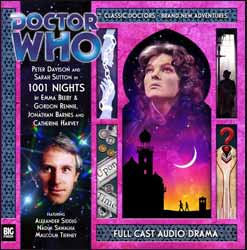|
Click here to return to the main site. Audio Drama Review
A long time ago, two travellers came from far away... In the perfumed palace of an omnipotent Sultan, a girl must tell stories to keep the man she cares about from a cruel and horrible death. She spins tales of distant lands she has visited with a mysterious traveller, of fabulous creatures and fantastic adventures... and of a blue box that can travel in time and space. Meanwhile, in the dungeons below the throne room, there lurks a secret which will bring down the kingdom - perhaps even the universe. Can the Doctor and Nyssa escape from this never-ending story before the final chapter spells their end...? Peter Davison and Sarah Sutton are no strangers to portmanteau pieces such as this - four different stories spread across four episodes, in place of this range’s usual four-part serial structure. Indeed, the last time the Fifth Doctor and Nyssa travelled together (without any other companions) it was in just such an anthology, The Demons of Red Lodge and Other Stories in 2010. However, 1001 Nights is somewhat different. It retains elements of the serial structure by linking the tales together with a frame narrative: that of Nyssa spinning stories to a sinister Sultan (played by Deep Space Nine’s Alexander Siddig). In a similar manner to The Trial of a Time Lord, the linking scenes keep the TARDIS crew in jeopardy in between the flashbacks, and the resolution of this arc occupies the whole of the final episode. The other three stories also connect with the frame narrative to varying degrees. The first one, co-written by Emma Beeby and Gordon Rennie, who also penned the Sultan sequences, deals with an insane asylum in space, where there is some considerable confusion over who, out of the prisoner (Teddy Kempner) and the warder (Malcolm Tierney), is the real tyrant. This ties in with the delusional state of the Doctor’s fellow prisoner (Nadim Sawalha) in the frame narrative. The second episode, a sort of 19th-century Exorcist written by Jonathan Barnes, deals with possession - which becomes a pertinent theme during the finale. The third episode, by Catherine Harvey, develops the whole notion of storytelling, presenting a fascinating society in which jokes and stories are used as currency... and become a motive for crime. This is my favourite part of the anthology. We also hear snippets of other tales told by Nyssa, including an amusing version of one of the travellers’ adventures, adapted for an Eastern audience by turning the TARDIS into a magic carpet! Nyssa also explains to the Sultan how she first met the Doctor, who at the time had a very different appearance. We don’t hear the whole story, of course, but you could choose to watch your DVD of The Keeper of Traken at this point! Sound designer Jamie Robertson includes delightful references to Nyssa’s theme from that serial in his musical score. The first and final episodes do feel slightly constrained, with both the asylum arc and the Sultan story having potential for further development, but Siddig jumps at the chance to spread his acting wings during the finale. Whether you listen to it in one go or over several days, you will find plenty to entertain you in 1001 Nights. 7 Richard McGinlay |
|---|

